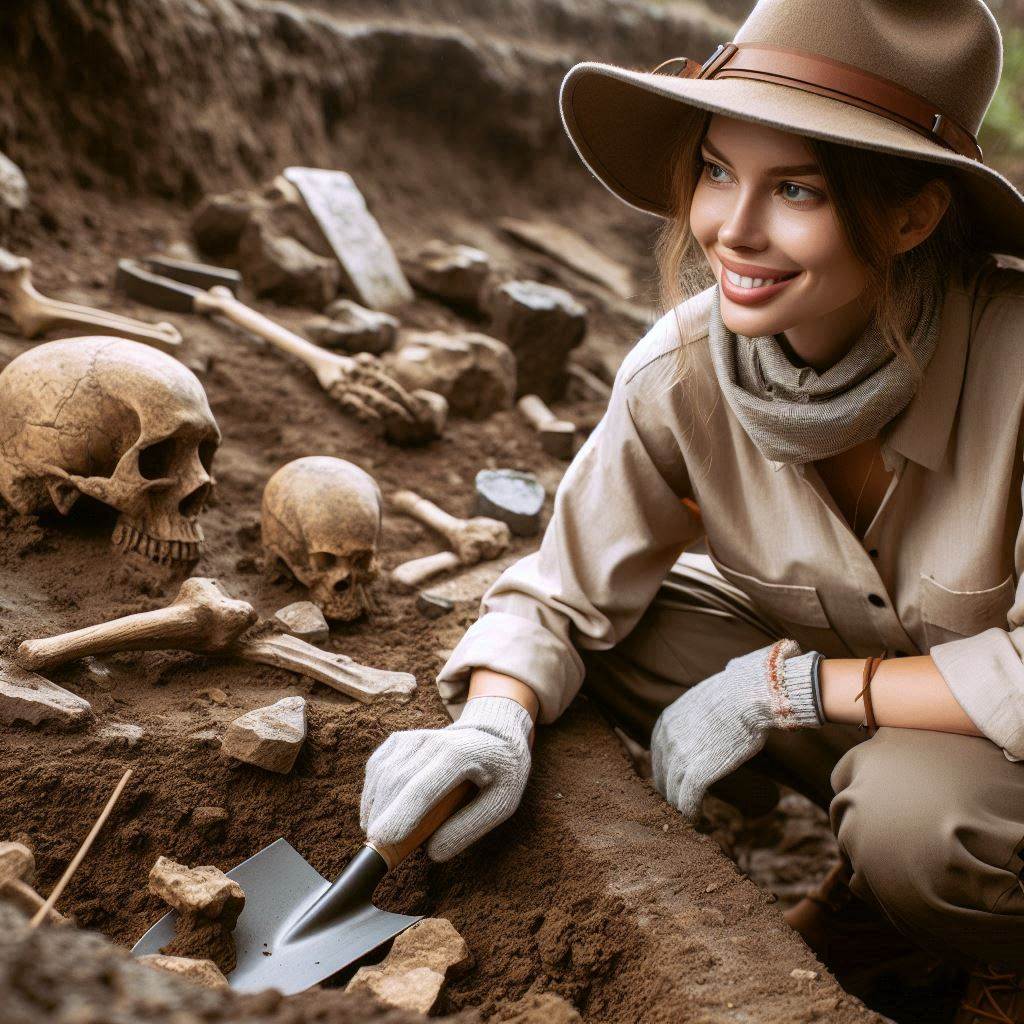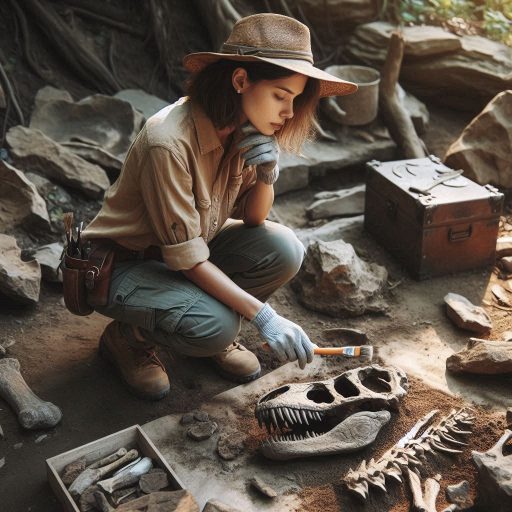Introduction
Field experience in archaeology refers to practical hands-on training outside of the classroom.
This experience allows students and aspiring archaeologists to apply their knowledge in real-world settings.
Gaining field experience is crucial for developing essential skills in excavation, analysis, and research methodologies.
It also helps build professional networks and enhance career prospects in the field.
Many opportunities exist for gaining field experience.
First, pursuing a degree in archaeology or a related field provides foundational knowledge.
Next, volunteering at archaeological sites or museums offers valuable hands-on experience.
Internships and field schools further enhance practical skills in excavation and analysis.
Joining professional associations connects aspiring archaeologists with experienced professionals.
Additionally, exploring fieldwork abroad exposes students to diverse archaeological practices and cultural contexts.
Independent research projects allow individuals to apply their skills and showcase their expertise.
In this blog, we will discuss essential steps to gaining field experience in archaeology.
We will explore the significance of research and education, volunteer opportunities, internships, and more.
Engaging in these experiences prepares aspiring archaeologists for successful careers in this fascinating field.
Research and Education
Pursue a Degree in Archaeology or Related Field
To gain field experience in archaeology, pursuing a degree in archaeology or a related field is essential.
This foundational step equips you with the knowledge and skills necessary for a successful career.
Most universities offer Bachelor‘s, Master‘s, and Ph.D. programs in archaeology or anthropology.
These programs cover essential topics such as excavation techniques, artifact analysis, and cultural history.
Gain Knowledge and Skills Through Coursework and Research Projects
Engaging in coursework provides a comprehensive understanding of archaeological methods.
Students learn about site surveying, data collection, and laboratory analysis.
Many programs also emphasize hands-on experiences through fieldwork components.
This practical training allows students to apply theoretical knowledge in real-world scenarios.
In addition to formal education, participating in research projects enhances your skills.
Many universities encourage students to engage in faculty-led research initiatives.
These projects often involve excavation, artifact cataloging, and historical analysis.
Participating in research exposes you to the latest archaeological techniques and methodologies.
Collaborating with experienced archaeologists during research projects is invaluable.
Their mentorship helps you refine your skills and develop a professional network.
Networking can lead to future internship opportunities or job placements.
Attend Conferences, Workshops, and Seminars to Stay Updated in the Field
Attending conferences, workshops, and seminars keeps you updated in the field.
Many professional organizations, like the Society for American Archaeology, host annual conferences.
These events offer a platform to learn from leading experts and connect with peers.
Engaging in discussions at these events can inspire new ideas and approaches.
Workshops provide hands-on training in specific techniques and tools.
These sessions allow you to learn about advancements in technology and methodologies.
They often cover topics such as geospatial analysis, artifact conservation, and digital archaeology.
In addition to traditional conferences, online webinars have become popular.
These virtual events allow you to access expert knowledge without geographical constraints.
They are an excellent option for students with limited travel resources.
Reading academic journals and publications also expands your knowledge base.
Staying informed about recent discoveries and ongoing research helps you understand current trends.
Journals such as “American Antiquity” and “The Journal of Archaeological Science” publish valuable insights.
Engaging in online forums and discussion groups further connects you with the archaeological community.
These platforms facilitate discussions about various topics, from methodologies to ethical considerations.
Participating in these conversations fosters a sense of belonging in the archaeological field.
Gaining field experience in archaeology starts with a strong educational foundation.
Pursuing a degree, engaging in research projects, and attending relevant events enhance your skills.
Staying updated in the field through continuous learning and networking is vital for your career.
By actively participating in these opportunities, you position yourself for success in archaeology.
Volunteer Opportunities
Look for Volunteer Programs at Archaeological Sites or Museums
Volunteering is an excellent way to gain field experience in archaeology.
Many archaeological sites and museums offer volunteer programs for individuals eager to learn.
These programs provide valuable opportunities to work alongside professionals in the field.
To find these programs, research local archaeological organizations and institutions.
Check their websites for information about ongoing volunteer opportunities.
Many universities also have affiliated archaeological projects that welcome volunteers.
These projects often involve excavation, surveying, and artifact analysis.
Volunteering allows you to apply your academic knowledge in real-world settings.
Moreover, it demonstrates your commitment to the field, which is essential for building your resume.
Gain Hands-On Experience Working with Artifacts and Excavating Sites
Hands-on experience is crucial for developing your skills as an archaeologist.
Volunteering at archaeological sites offers practical experience in excavation techniques.
You will learn how to properly excavate, document, and preserve artifacts.
This direct involvement is invaluable for understanding the challenges and nuances of fieldwork.
Additionally, working in museums allows you to gain experience in artifact conservation and curation.
You may help catalog, clean, and restore items from archaeological collections.
This experience teaches you about the care and management of artifacts, a vital aspect of archaeology.
Field experience through volunteering also helps you develop critical skills.
You will learn about teamwork, problem-solving, and adaptability in various situations.
These skills are essential for successful careers in archaeology.
Network with Professionals in the Field for Future Opportunities
Networking is a significant advantage of volunteering in archaeology.
Working alongside experienced archaeologists allows you to build relationships in the field.
These connections can lead to internships, job opportunities, and mentorship.
Engaging with professionals gives you insights into their career paths and experiences.
Participating in volunteer programs also exposes you to various aspects of archaeology.
You may meet specialists in different areas, such as cultural resource management, conservation, and research.
Understanding these diverse roles helps you identify your interests and career goals.
Attending volunteer training sessions and workshops also fosters networking opportunities.
Many programs host events where volunteers can meet staff, researchers, and other volunteers.
These interactions allow you to ask questions and seek advice about pursuing a career in archaeology.
Furthermore, don‘t hesitate to reach out to professionals after your volunteer experience.
Follow up with them through email or social media to maintain connections.
Keeping in touch can lead to valuable recommendations and advice in your career.
Seeking volunteer opportunities in archaeology is vital for gaining field experience.
Volunteering at archaeological sites and museums provides hands-on experience with artifacts and excavation.
It also allows you to network with professionals who can guide your career.
By actively engaging in volunteer programs, you prepare yourself for success in the archaeological field.
Read: Exploring the Different Branches of Geology
Internships and Field Schools
Apply for Internships at Archaeological Sites or Research Institutions
Internships are a crucial step in gaining field experience in archaeology.
Many archaeological sites and research institutions offer internships for aspiring archaeologists.
These positions provide hands-on experience in various aspects of archaeological work.
You can apply your theoretical knowledge in real-world situations, enhancing your learning experience.
To find internships, research institutions that align with your interests.
Many universities have partnerships with archaeological organizations that provide internship opportunities.
Reach out to faculty members or career services for guidance on available internships.
They can connect you with potential opportunities based on your academic background.
Internships often involve assisting with excavation, surveying, and artifact analysis.
You may work alongside experienced archaeologists who can mentor you throughout the process.
This mentorship is invaluable, as it helps you develop essential skills and knowledge in the field.
Participate in Field Schools to Gain Practical Experience in Excavation and Analysis
Field schools offer structured training in archaeological techniques.
Participating in a field school allows you to gain practical experience in excavation and analysis.
These programs typically last several weeks and involve hands-on fieldwork under professional supervision.
During field schools, you learn excavation techniques, site documentation, and artifact recovery.
You may also receive training in lab analysis, helping you understand the lifecycle of artifacts.
This comprehensive experience is vital for developing your archaeological skills.
Field schools often attract participants from various academic backgrounds.
This diversity allows you to collaborate with peers and learn from each other.
You‘ll also gain exposure to different perspectives and methodologies in archaeology.
Many field schools also emphasize teamwork and collaboration.
Working closely with fellow students and instructors helps you build essential interpersonal skills.
These skills are critical for success in archaeology, where teamwork is often necessary for complex projects.
Build Relationships with Mentors and Colleagues for Recommendations and Future Collaborations
Internships and field schools provide excellent networking opportunities.
Building relationships with mentors and colleagues is crucial for advancing your archaeology career.
Experienced professionals can offer guidance, support, and recommendations as you pursue job opportunities.
During internships, engage actively with your supervisors and colleagues.
Ask questions, seek feedback, and express your interest in learning.
Showing enthusiasm and dedication can leave a lasting impression on your mentors.
After completing your internship or field school, maintain these professional connections.
Reach out via email or social media to express gratitude for their guidance.
Keeping in touch can lead to future collaborations and job opportunities.
Additionally, consider joining professional organizations in archaeology.
Membership often provides access to conferences, workshops, and networking events.
These activities further enhance your professional connections and knowledge in the field.
Pursuing internships and participating in field schools are essential steps for aspiring archaeologists.
These experiences offer practical skills, networking opportunities, and valuable mentorship.
By actively engaging in internships and field schools, you prepare yourself for a successful career in archaeology.
Read: Top Skills Needed for a Successful Geology Career

Professional Associations
Join Professional Organizations Such as the Society for American Archaeology
Joining professional organizations is a valuable step for aspiring archaeologists.
Organizations like the Society for American Archaeology (SAA) offer numerous benefits.
Membership connects you with professionals who share your interests and goals.
These associations provide a platform for networking and career development.
SAA membership includes access to resources tailored to archaeological professionals.
You gain insights into the latest research and advancements in the field.
The organization publishes a range of materials, including journals and newsletters.
These publications keep you informed about significant developments in archaeology.
Additionally, joining professional associations enhances your credibility.
Membership signals your commitment to the field and professionalism.
It also demonstrates your dedication to ethical practices and ongoing education.
Attend Events, Conferences, and Networking Opportunities to Meet Professionals in the Field
Attending events and conferences organized by professional associations is crucial for networking.
These gatherings provide opportunities to meet established archaeologists and fellow students.
Engaging in discussions can lead to valuable connections and potential collaborations.
Conferences often feature presentations, workshops, and panel discussions.
These events allow you to learn from experts and expand your knowledge.
Participate actively by asking questions and sharing your insights.
Your engagement can help you stand out among peers and professionals.
Networking during these events is essential for your career development.
Exchange contact information with professionals you meet.
Follow up with them after the event to nurture these connections.
These relationships may lead to job opportunities, internships, or research collaborations.
Access Resources, Job Listings, and Support for Career Development in Archaeology
Professional associations provide numerous resources to support your career development.
Many organizations maintain job boards with listings specifically for archaeology positions.
These listings can help you find internships, fellowships, and full-time jobs.
In addition to job listings, associations often offer mentorship programs.
These programs connect you with experienced professionals who can guide your career path.
Mentors provide valuable insights, advice, and support as you navigate your journey.
Many organizations also host webinars and workshops focusing on professional development.
These sessions cover various topics, including grant writing, project management, and field techniques.
Participating in these programs enhances your skill set and prepares you for diverse career paths.
Moreover, being part of a professional association fosters a sense of community.
You can share experiences and challenges with others who understand your field.
This network provides emotional support and encouragement as you pursue your goals.
Joining professional associations significantly benefits aspiring archaeologists.
These organizations provide networking opportunities, valuable resources, and career support.
By actively participating in professional associations, you enhance your skills and develop meaningful connections in the field of archaeology.
Read: The Future of Botany: Emerging Fields and Innovations
Fieldwork Abroad
Explore Opportunities for International Fieldwork Through Universities or Organizations
Participating in international fieldwork is an enriching experience for archaeology students.
Many universities offer programs that facilitate study abroad opportunities.
These programs allow you to work on archaeological sites worldwide.
Organizations also provide options for students seeking fieldwork experiences abroad.
Research your university‘s study abroad offerings in archaeology.
Many institutions partner with overseas universities or archaeological organizations.
These partnerships create opportunities for students to engage in excavation projects.
You can gain hands-on experience while exploring different archaeological practices.
Additionally, various organizations specialize in international archaeological projects.
These organizations often seek volunteers and interns for fieldwork abroad.
Conduct thorough research to find reputable organizations with good track records.
This research ensures you engage in meaningful projects that benefit both you and the host community.
Gain Exposure to Different Cultural Contexts and Archaeological Practices
Fieldwork abroad exposes you to diverse cultural contexts and archaeological methodologies.
Each country offers unique historical perspectives and excavation techniques.
Immersing yourself in a different culture enhances your understanding of global archaeology.
Working alongside local archaeologists helps you learn about their practices and traditions.
You gain insights into how cultural contexts shape archaeological interpretation.
This exposure broadens your knowledge and appreciation for various archaeological approaches.
Moreover, collaborating with international teams fosters cultural exchange.
You learn to adapt to different working styles and communication methods.
This experience enriches your personal and professional development in archaeology.
Develop Cross-Cultural Communication and Collaboration Skills in Fieldwork Settings
Fieldwork abroad is an excellent opportunity to develop cross-cultural communication skills.
Effective communication is essential when working with diverse teams.
You learn to navigate language barriers and cultural differences during fieldwork.
Building relationships with local communities enhances your field experience.
Engaging with community members fosters mutual respect and understanding.
This collaboration can lead to more successful archaeological projects and discoveries.
Additionally, international fieldwork challenges you to think critically about cultural heritage.
You become aware of the ethical considerations surrounding archaeological practices in different contexts.
This awareness helps you become a more responsible and informed archaeologist.
Participating in fieldwork abroad also allows you to build a professional network.
You connect with fellow students, local archaeologists, and professionals from various countries.
These connections can lead to future collaborations and job opportunities.
Pursuing fieldwork opportunities abroad greatly enhances your archaeological education.
Engaging in international projects exposes you to diverse cultures and practices.
This experience develops valuable skills in communication and collaboration.
Ultimately, fieldwork abroad enriches your understanding of archaeology and prepares you for a successful career in the field.
Read: What Does a Geologist Do? Career Overview and Insights
Transform Your Career Today
Unlock a personalized career strategy that drives real results. Get tailored advice and a roadmap designed just for you.
Start NowIndependent Research Projects
Plan and Conduct Your Own Research Projects in Archaeology
Conducting independent research projects in archaeology is a valuable way to deepen your understanding of the field.
Start by identifying a research topic that interests you.
Consider focusing on a specific culture, site, or archaeological method.
Choose a topic that excites you and has available resources.
Once you have a topic, develop a clear research question.
This question will guide your project and provide direction.
Outline your research objectives and methodology.
A well-structured plan will help you stay organized throughout the research process.
After outlining your project, begin gathering data.
Utilize libraries, online databases, and fieldwork to collect relevant information.
Engage with primary sources, such as artifacts and excavation records, when possible.
This hands-on approach enriches your research and enhances your findings.
Collaborate with Mentors or Peers for Guidance and Support
Collaborating with mentors or peers is essential for successful independent research.
Seek guidance from experienced archaeologists, professors, or researchers.
They can offer valuable insights and feedback on your project.
Forming study groups with fellow students can also be beneficial.
Collaborating with peers allows for exchanging ideas and discussing challenges.
Together, you can troubleshoot research problems and develop innovative solutions.
Mentorship provides additional support during your research journey.
A mentor can help you refine your research question and improve your methodology.
They can also connect you with resources, such as archival materials or fieldwork opportunities.
Present Findings at Conferences or Publish in Academic Journals
Sharing your research findings is a crucial step in your academic journey.
Presenting at conferences allows you to showcase your work to a wider audience.
Look for local, national, or international conferences focused on archaeology.
Prepare a compelling presentation that highlights your research question, methods, and findings.
Engaging presentations can spark discussions and inspire future collaborations.
You may receive valuable feedback from professionals in the field.
Additionally, consider publishing your research in academic journals.
Many journals welcome submissions from emerging scholars.
Publishing enhances your credibility and showcases your expertise in archaeology.
Before submitting, review the journal‘s guidelines and tailor your work accordingly.
Highlight the significance of your research and its contributions to the field.
A well-written article can significantly impact your academic and professional reputation.
Pursuing independent research projects is vital for aspiring archaeologists.
It allows you to explore topics of interest while developing essential skills.
Collaborating with mentors and peers provides guidance and support throughout the process.
Presenting findings at conferences and publishing in academic journals showcases your expertise and contributes to the field.
Embrace the opportunity to conduct independent research and make your mark in archaeology.
See Related Content: Essential Skills Every Aspiring Geneticist Needs
Conclusion
Gaining field experience in archaeology requires dedication and proactive efforts.
Start by pursuing a relevant degree in archaeology or a related field.
This foundational education provides essential knowledge and skills for future opportunities.
Next, seek volunteer opportunities at archaeological sites or museums.
Volunteering allows you to gain hands-on experience while networking with professionals.
Additionally, apply for internships and participate in field schools.
These experiences enhance your practical skills in excavation and analysis.
Joining professional associations, such as the Society for American Archaeology, expands your network.
Attend events and conferences to meet industry professionals and access valuable resources.
Consider pursuing fieldwork abroad to gain diverse perspectives on archaeological practices.
Lastly, plan and conduct independent research projects.
Collaborate with mentors to enhance your research skills and showcase your findings.
Present your work at conferences or publish in academic journals to establish credibility.
Hands-on experience is vital for advancing a career in archaeology.
It builds essential skills and fosters professional connections.
Aspiring archaeologists should actively pursue fieldwork and professional development opportunities.
Engaging in these experiences prepares you for a successful and fulfilling career in archaeology.




